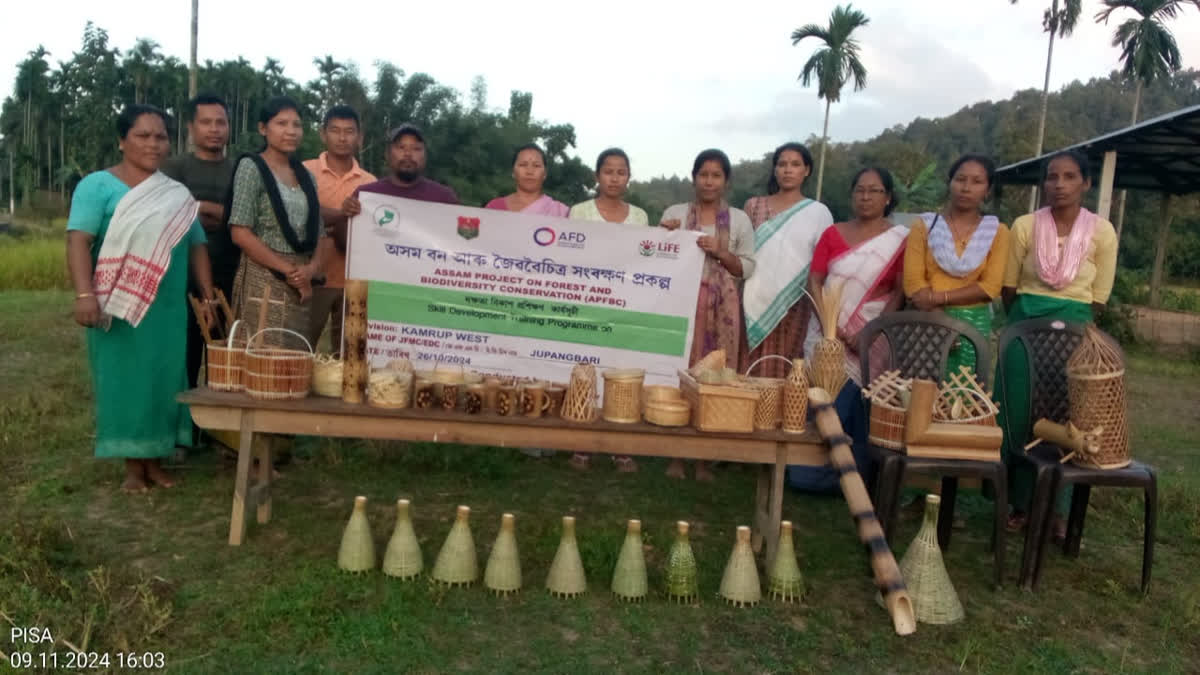Jupangbari:A remote village in Assam's Kamrup district has turned into a hub of indigenous bamboo ornaments and decorative pieces, utilising the state's abundant natural resources.
The people of the village, particularly the women, seem to have already carved a niche in the field of artificial jewellery using bamboo and seeds of trees from the nearby forests, which are sustainable and eco-friendly unlike traditional plastic or glass ornaments. Belonging to the most marginal farming families, these village women have now been supplementing the family income besides creating an identity for themselves.
Women making bamboo products (ETV Bharat) At least 15 women of the total 65 families in Jupangbari village are now actively engaged in making these artificial ornaments and decorative pieces that have also found a market in Guwahati and other places to sell their products.
"We are basically farmers. My husband works in the paddy field during the harvest season. I used to help my husband in the field. However, two years back I got training on making bamboo jewellery. Since then I have been taking out time from household work and designing bamboo jewellery," Junmoni Rabha, a village woman said. Junmoni is happy to contribute in her family income.
Junmoni is not the only one who has benefited out of the training. At least 15 women in the village are now engaged in making jewellery and decorative pieces and are selling their products through different community fairs and local festivals. Most of these women belong to the farming community and the new skill has become an alternative income generating mechanism for them.
Women undergoing training (ETV Bharat) The families have been facing financial hardships as farming had not been very lucrative these days due to several reasons. While the changing climate is affecting the marginal farmers the most due to change in rainfall pattern and temperature across the state, the farmers in Jupangbari also face elephant menace, which affects their paddy yield every year.
A native of the village, Pallav Rabha underwent a training on making jewellery and decorative pieces at the Indian Institute of Entrepreneurship (IIE) in Guwahati a few years back. After making jewellery and decorative pieces at home for few months, Pallab thought of training these women which would not only give them an identity but also a means to become financially independent.
"The women from the village are very hardworking. They take several responsibilities ranging from taking care of the household chores to helping the men on the fields and taking care of children. However, they are the ones without an identity of their own," said Pallav Rabha.
Innovative bamboo products are being made (ETV Bharat) "I showed them some of the products made by me and convinced them for the training. Although initially it was difficult to bring them for the training, things improved gradually and soon I had 15 women who came for the training. Hailing from village, they already knew a lot about bamboo and other seeds of the trees and the forest products. I just helped them with refining their skills to create an aesthetic and attractive product so that it sells in the market. They excelled soon and all of them have been making the products since then," said Pallav.
Pallav said that while the women sell their own products in the nearby fairs and during the festivals, some of their products have also been showcased in some fairs in Rajasthan.
Bamboo baskets and trays are in high demand (ETV Bharat) "I have been making jewellery since the last two years. The jewellery sets I make cost between Rs 500 to Rs 1500. I sold them in the Chandubi Festival, a tourism event organised at Chandubi located close by, and the response was good. The demand for such items has been increasing. The money I earn help me to bear the school fees of my children," said a happy Junmoni.
"Apart from bamboo jewellery I have been making different decorative pieces like flower sticks, bouquet, tray, bamboo cups, bamboo basket and vanity bags for women and others. Now there are some traders who gives me advance for making such items and they collect the product from my home," said Saramika Rabha, who is very happy to supplement the family income.
Pallav however, said that there are issues in taking out these women for training while at times their family members does not allow them to go for work, sometimes it is the household chores that keeps them busy. He however, said that things are changing and the 15 women in Jupangbari have become change agents ready to drive the most-needed change in the area.
"I am happy that we have 15 women in two years. I am sure more women will come out of their comfort zone and will join us in carving a niche for themselves also," said Pallav.
Read more
- After Traditional Rice Beers, an Assam Village Eyes GI Tag for Traditional Jewellery
- From Humble Beginning To 300 Bee Colonies: Kashmir Beekeeper Sania Zehra's Sweet Success Story
